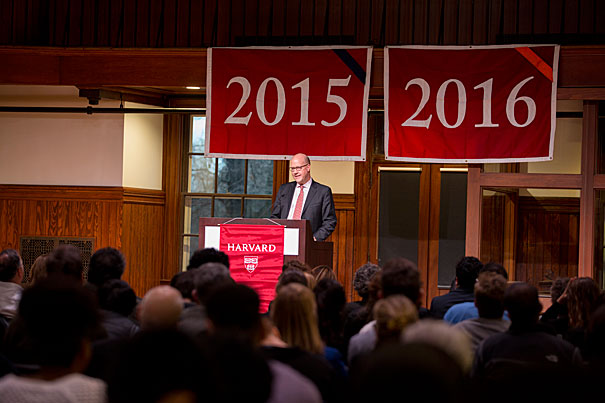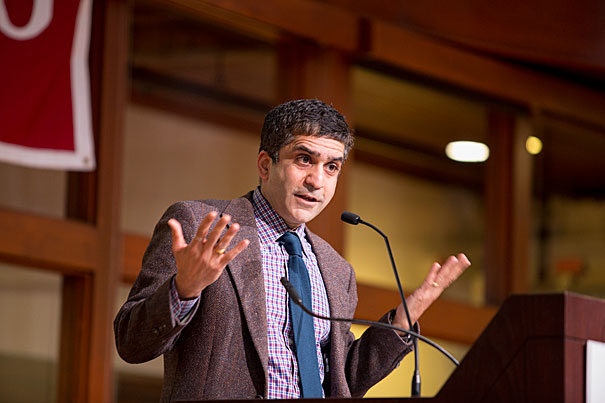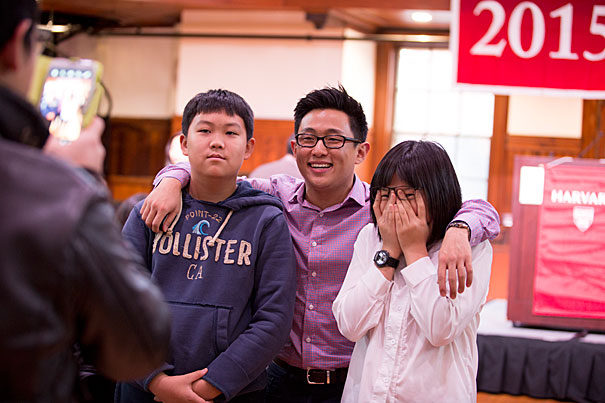
Executive director of the Harvard Alumni Association Philip Lovejoy spoke at The Harvard University Mid-Year Graduation ceremony which was held at the Knafel Center at Radcliffe
Rose Lincoln/Harvard Staff Photographer
The less-traveled path
Midyear Graduates Recognition Ceremony pays tribute to more than 100 seniors
The much-traveled path through Harvard College is a four-year cycle that ends in a breathtaking Commencement ceremony on Harvard Yard each spring.
But every Harvard student has a unique story, and sometimes their individual choices take students on journeys toward graduation off the traditional cycle.
Family, friends, classmates, professors, and school officials gathered last Friday to celebrate the accomplishments of this year’s class of more than 100 seniors at the Midyear Graduates Recognition Ceremony in the Radcliffe Institute’s Knafel Center.
“Some of these unplanned detours can lead to some of the most magical and exhilarating experiences of our lives, despite the momentary shock and reconsideration that it can cause,” Rakesh Khurana, the Danoff Dean of Harvard College, told attendees gathered at the ceremony. “Life intervenes, and we have to grapple with uncertainty, and it is in those moments of uncertainty that we encounter serendipity.”
Educational detours can be both planned and unplanned. Some students accelerate their studies and graduate early. Others take time off from school for internships or for personal projects, travel, or family emergencies. Gabriel Bayard ’15 worked on a campaign for a labor movement in Boston and took a break from his Harvard studies.
“I figured it would be really helpful to me to take a breath away from Harvard, but still be in Boston and be around friends,” he said. “It was a great decision.”
Julia F.P. Ostmann ’15-16, chosen by the 2016 Senior Class Committee to reflect on her experience at the College, reminded the audience of the struggles of poet T.S. Eliot, who was once placed on academic probation by the College. She said that Eliot took a nontraditional path to eventual success, eventually graduating early from Harvard and in 1948 winning the Nobel Prize in Literature.
“What I believe is that in taking time off or in choosing to graduate early — in committing to field research in India or freelance writing or White House internships or taking the time and space to heal — or in my case 113 episodes of ‘Parks and Recreation’ — our attention shifts,” said Ostmann. “We stand outside of Harvard, and we see it differently. Maybe just slightly, maybe just enough to gain a newfound appreciation … or maybe you finally feel you get it.”


Harvard College dean Rakesh Khurana spoke at ceremony. Graduate Stephen J. Kim poses with some slightly unwilling subjects.
Rose Lincoln/Harvard Staff Photographer
In her faculty address, Maria Tatar, the John L. Loeb Professor of Germanic Languages and Literatures and of Folklore and Mythology, told students there is great value in the struggles and challenges of life. She reminded seniors to continue creating even in the face of rejection and to always be present in life.
“You are facing chaos, chance, serendipity, and life suddenly resembles a pinball game,” she said. “Failures, the moments of gloom and exhaustion in your life, are exactly what will set you right.”
Philip Lovejoy, executive director of the Harvard Alumni Association, reminded students that their connection to Harvard does not end with graduation and encouraged them to tap into the vast network of alumni around the world.
“You can continue to be the change here, working to make Harvard a better version of itself,” he said. “Alumni lead Harvard. Alumni champion and protect the University.”
The ceremony marked a journey of accomplishment for Virginia Marcus ’15, who took more than a year off to explore the entertainment industry where she hopes to find a career.
“All my friends have graduated, but this is wonderful and I’m so excited,” she said. “I’m moving to [Los Angeles] in January, and I’m terrified, but I’m so inspired.”
It was also a proud day for Bayard’s parents, Mireya Herrera and Jean Pierre Bayard, who traveled from California to attend the ceremony.
“It’s emotional, and we hope that he finds his way,” said Bayard. “It’s a great education and he is well set for the future.”
Khurana told the students that he sees much promise in their futures and in their ability to make a contribution to the world.
“I hope [Harvard] has given you an independent mind, a spirit that dares to explore, a commitment to inclusivity, and a heart that reaches out to others and sees others with gentler eyes,” he said. “I hope it has transformed you and that it will help you develop the will to tackle the real problems that confront our world, and move our society in the direction we need to go to, and thrive.”
The ceremony is not intended to serve as a replacement for Commencement. Graduates and families wishing to learn more about receiving diplomas and walking in May are invited to contact the FAS Registrar’s Office and the Harvard Alumni Association.




